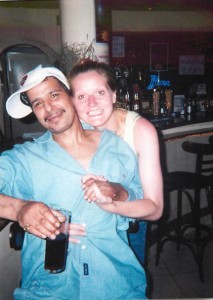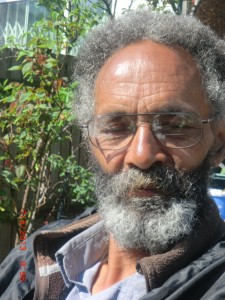by Satish Sekar © Satish Sekar (March 23rd 2011)
Hope
Two months ago Yusef Abdullahi passed away, aged just 49. It could and should have been different. Eight years ago I helped to arrange care that he desperately needed. Abdullahi was in a terrible state. He was by his own admission, addicted to heroin and had an alcohol problem too. It was a sadly familiar story and those just didn’t tend to end well. Tony Paris wasn’t in as bad a state, but he needed help as well and Stephen Miller was on their doorstep. It came as no surprise that he required help as well. None of them were given the assistance that the State which had wronged them owed them.
The Miscarriages of Justice Project (MJP) had been established in 2003 to provide advice and assistance to victims of miscarriages of justice to help them rebuild their lives, but there was a problem. The scheme excluded the Cardiff Three totally and many others too. Only people whose convictions had been quashed after an out of time appeal or a reference back by the Criminal Cases Review Commission (CCRC) qualified for help.
Uncaring
This had not been the original intent of Parliament, so they were approached to help anyway. The MJP agreed that it was the perfect opportunity for them and for Abdullahi to illustrate the absurdity of a policy that forced them not to help even in a clear cut miscarriage of justice just because they had the temerity to win their first appeal, but its then Deputy Director Amarjit Kaur pulled the plug.
She claimed that if they even went to see them and assessed their needs, they could lose their funding and not be able to help others, so why had her staff agreed to the visit in the first place? “It’s outrageous,” said miscarriage of justice victim John Kamara. “He was a victim of a miscarriage of justice and clearly needed help. They should have given it to him. What use are they if they won’t help people like Yusef when he needed it?”
Lies
Michael O’Brien, himself a victim of one of Wales’ most notorious miscarriages of justice, raised the issue of people like the Cardiff Three being excluded with the MJP. He even asked, years later, why Abdullahi was not helped when it was promised. He was told that Abdullahi was offered counselling and turned it down.
This is not true. Who says so? Abdullahi for one. Others, including his QC, Roger Backhouse, who helped fill the void created by the lack of care for him, can attest to it. “Yusef was very appreciative of the help that I gave him”, Backhouse said. “He acknowledged and thanked everyone who had taken the trouble to help him.” The MJP was not on that list; he confirmed that he had never received any help from the MJP or offers of help from it.
Long Overdue
After-care for victims of miscarriages of justice was an idea whose time had come at the turn of the millennium. Following Parliamentary questions to then Home Office Ministers Lord Williams of Mostyn and Paul Boateng in the late 1990s, the Home Office’s Probation Unit, which became the National Probation Directorate, established a Working Group in July 2000 to consider how to provide help to victims of miscarriages of justice.
The late Lord Williams had recommended that a voluntary sector organisation that was familiar with resettlement of prisoner issues should develop a national service to provide advice and counselling that was tailored to meet the needs of successful appellants. There was no suggestion in his answer that any groups of victims should be excluded.
Errors of Judgement
We can reveal that despite the clear wishes of Lord Williams, many victims of miscarriages of justice have been denied assistance to rebuild their lives because they did not serve long terms of imprisonment. In fact, they were excluded by an error made by the consultant that the Working Group commissioned to scope the service to be provided.
Peter Shore’s job included devising a service based on the needs of former prisoners who had successfully appealed against their convictions. He also had to investigate the potential number of clients and average length of time served in prison. After that he had to consider whether those who had served the longest should be treated as priority users of the service. There was no suggestion in his terms of reference that prisoners who had served long terms of imprisonment should be the only beneficiaries of the scheme.

But Shore did not follow his terms of reference. The report of the Home Office Working Group itself which made the recommendations that resulted in the MJP being set up makes that clear. “The scoping study looked at the two primary sources of clients in need of an advice service: referrals by the Criminal Cases Review Commission (CCRC) to the Court of Appeal and out-of-time appeals. The Report notes that 80 per cent of the cases referred by the CCRC in 1999/2000 resulted in success for the appellant. This suggests a likely annual figure of around 15-20 new cases each year. There are also likely to be a small number of additional cases per year arising from successful out-of-time appeals. In total, the annual case load for an advice service is likely to be in the region of 70 cases per year (new referrals prior to release, existing cases – immediately after release – plus cases requiring support beyond the immediate post-release period).” [their emphasis].
It is clear from that passage that Shore never investigated whether people whose convictions had been quashed on an in-time first appeal had any care needs at all. The Working Group had emphasised the wrong part. This is the important bit. “The scoping study looked at the two primary sources of clients in need of an advice service: referrals by the Criminal Cases Review Commission (CCRC) to the Court of Appeal and out-of-time appeals.”
Shore had just admitted that he had not followed his own terms of reference and had wrongly devised a service that excluded people who had won in time first appeals. Worse still the Home Office Working Group had not only failed to notice that he had not followed his terms of reference, but commended him for his work and established a so-called service that excluded first time successful appellants like the Cardiff Three and also Annette Hewins and Donna Clarke. As a result of these failings the vast majority of successful appellants were excluded from the provision of after-care. Only Fitted-In highlighted this scandal.
Restitution
“Yusef is the only client that I would do this for”, Backhouse reiterated. “The state has a duty to restore people like him to the position they should have been in. They let him down. It is shameful that the consultant did not follow his terms of reference and that the Working Group did not notice his error. Their mistakes denied Yusef and others in his position the help that they needed”.
Abdullahi was fortunate, if that is the right word. He found that there were people who cared enough to help, but he tested their boundaries. He pushed people away hard. They came back time and time again. Eventually he saw that there was another way for him and he took that opportunity. Despite the odd lapse he stuck to the plan that was developed for him, based on his individual needs. Dev Barrah and George Silcott played an important role in helping Abdulahi too.
He managed to overcome some of his demons, but sadly lasting damage had been done and he died too soon. “The way Yusef was treated disgraces our society”, said Backhouse. “I was not surprised that he became a passionate advocate for restitution. His legacy must include an end to this scandal”.




